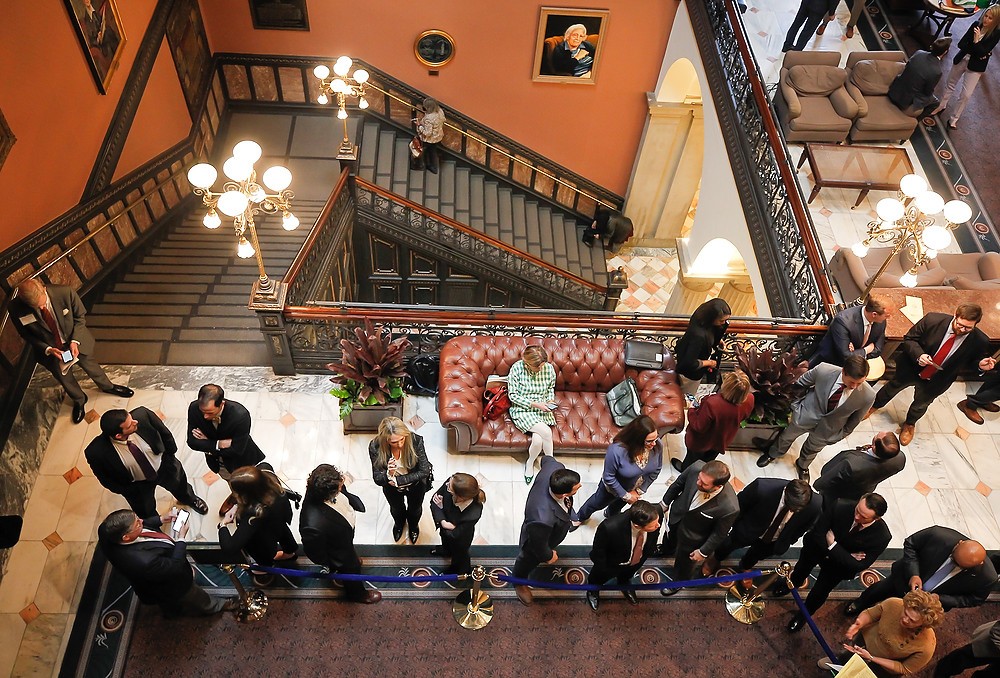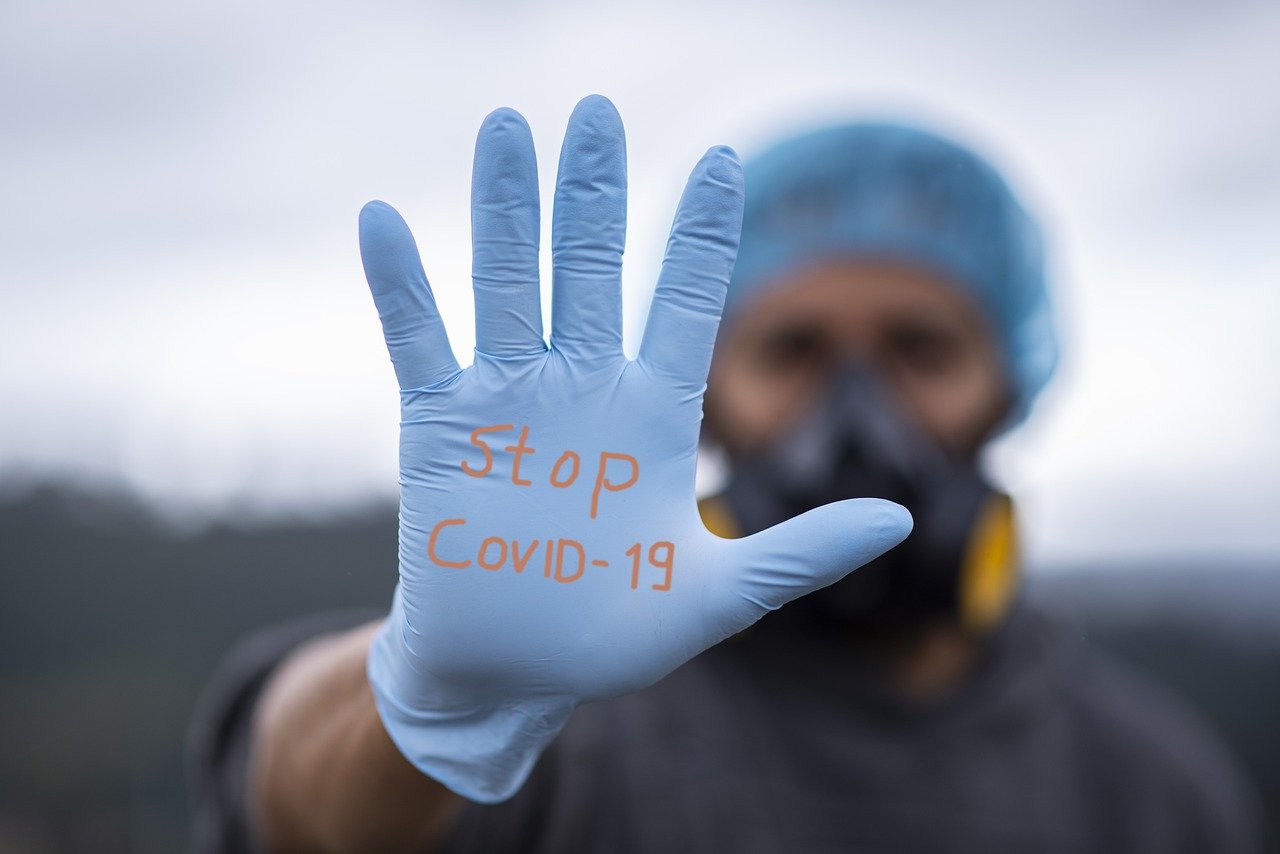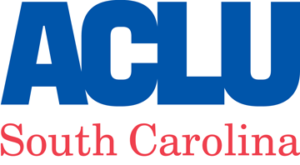STATEHOUSE REPORT | ISSUE 21.20 | MAY 20, 2022
BIG STORY: A look at South Carolina’s new laws
NEWS BRIEFS: New COVID-19 cases rising in South Carolina
LOWCOUNTRY, Ariail: Rumble, rumble, rumble
COMMENTARY, Brack: The scratchy shroud of gun violence is killing the U.S.
SPOTLIGHT: ACLU of South Carolina
FEEDBACK: Send us your thoughts
MYSTERY PHOTO: Kayakers
A look at South Carolina’s new laws

By Andy Brack | The S.C. General Assembly passed 129 new laws during the 2022 session, including measures to spend lots of money, redraw legislative districts, allow early voting, ban vaccine mandates and keep transgender students from playing women’s sports.
All but 17 have been signed into law. Gov. Henry McMaster vetoed seven bills, all dealing with county school matters, but the legislature overrode four. Among the three that were not overridden was a House-initiated measure seeking partisan school board elections in Lancaster County. For now, the county’s school board elections remain non-partisan.
Each of the remaining 17 bills was sent to the governor May 18 following the end of the session last week. Those bills, including a measure establishing minimum requirements for registers of deeds, are expected to be signed into law in coming days.
Among the new laws in South Carolina:
Reapportionment. In keeping with federal law to redraw state House, state Senate and congressional districts, the General Assembly reapportioned district lines in a measure that drew a lawsuit from the ACLU and NAACP for being rife with gerrymandering favoring Republicans. To settle the lawsuit, state representatives agreed to redraw maps that the ACLU said will “restore Black voters’ opportunity” inOrangeburg, Richland, Kershaw, Dillon and Horry counties.
Convention of states. Lawmakers approved a resolution calling for a convention of the states to make amendments to the United States Constitution on fiscal restraints on the federal government as well as limits on its power, terms of members and jurisdiction. As of this month, 19 states passed the measure – 15 short of what’s needed for a convention to be called.
Religious Freedom Act. The law provides for the “protection of the exercise of religion during a state of emergency (and) to define necessary terms to provide that religious services are deemed to be essential services during an emergency that must be allowed to continue operating,” along with other provisions.
Vaccine mandates. The law says the state or its political subdivisions may not enact a vaccine mandate and may not terminate or suspend a first responder based on vaccination status, with other provisions.
Election reform. State lawmakers included several election law changes, including codifying early voting up to two weeks before primary or general elections.
Pandemic relief spending. Legislators authorized more than $2 billion of spending of federal pandemic relief monies, including $453 million to the state Department of Transportation to speed road projects, $900 million to the Rural Infrastructure Authority for community water and sewer improvements, and $400 million to the Office of Regulatory Staff to extend broadband networks.
Family leave. The General Assembly approved paid parental leave for “eligible state employees.” Birth mothers can get up to six weeks of paid leave at 100 percent of the employee’s base pay, while non-birth partners can get up to two weeks of leave, with several provisions and restrictions.
Teacher planning. A new law allows public school teachers to have 30 minutes of unencumbered time for planning.
Sports act. Another law bans transgender students from playing women’s high school and college sports.
Solid waste. The legislature approved new solid waste policy, management and recycling regulations, including measures related to solar panels and projects.
Do not resuscitate. This law allows parents or guardians to request or revoke do-not-resuscitate orders for emergency services for children, with exceptions.
Lawmakers will return to Columbia in June to finish the state budget and deal with any gubernatorial vetoes.
- Have a comment? Send to: feedback@statehousereport.com.
New COVID-19 cases rising in South Carolina

Staff reports | As the number of deaths from COVID-19 topped 1 million this week, South Carolina’s number of COVID-19 cases is rising again, according to the latest weekly data released by the state Department of Health and Environmental Control (DHEC) on Tuesday.
The agency reported 5,566 total new cases of COVID-19 — an increase over last week’s 4,458 cases – and 10 total new deaths, compared to last week’s four. More: Charleston City Paper, The Post and Courier, The New York Times.
In other recent news:
![]() McMaster signs early voting into law. Gov. Henry McMaster signed into law on Wednesday no-excuse early voting ahead of the June primaries. Voters can get out and vote two weeks ahead for every election in South Carolina. Early voting for the June 14 primaries begins May 31.
McMaster signs early voting into law. Gov. Henry McMaster signed into law on Wednesday no-excuse early voting ahead of the June primaries. Voters can get out and vote two weeks ahead for every election in South Carolina. Early voting for the June 14 primaries begins May 31.
- McMaster signs transgender sports ban. S.C. Gov. Henry McMaster quietly signed into law a bill that would ban transgender students from playing girls’ or women’s sports in public schools and colleges.
Two charities receive money after a S.C. senator sat on the checks. State grant checks mysteriously disappeared for two charities in the care of Sen. Karl Allen, D-Greenville. Allen had originally been entrusted to deliver a combined $75,000 to those charities. The money was originally planned to be used to pay for an afterschool program for underprivileged children and a fitness park for low-income seniors.
CONGRESS: Scott, 3 others in GOP seek to stop student loan forgiveness bill. U.S. Sen. Tim Scott, R-S.C., is one of four senators looking to stop a progressive proposal. Scott is joined by Sen. Mitt Romney, R-Utah; Bill Cassidy, R-La.; and Thom Tillis, R-N.C.; The four introduced the Student Loan Accountability Act on Wednesday.
- Haley, Scott plan Iowa visits, fueling 2024 speculation. Two prominent South Carolina Republicans are headed to Iowa next month, ramping up speculation that the two are planning a bid for the presidency in 2024.
- Mace votes against baby formula bill. U.S. Rep. Nancy Mace voted against the Infant Formula Supplemental Appropriations Act Wednesday. The bill provides $28 million in emergency funding to the Food and Drug Administration (FDA) for resources to increase the number of FDA inspection staff, prevent fraudulent formulas from being sold and protect against future shortages.
Columbia Starbucks on strike to unionize. Employees at a Columbia-area Starbucks are on strike following the announcement that a Starbucks in Greenville confirmed its unionization. The employees at the Starbucks claim to have received backlash from the company for trying to unionize, which they started in March.
S.C. ranks No. 11 for DUI-related incidents. South Carolina ranked No. 11 in a recent Zutobi report measuring DUI-related metrics such as arrests and fatalities. According to the report, 29% of all road fatalities in South Carolina were DUI-related while nationwide, drunk driving accounted for 30% of all road fatalities.
S.C. ranked 4th in Great Resignation. A new study from WalletHub examined statistics from the U.S. Bureau of Labor Statistics for 2022 and found that South Carolina had a 4% rate of quitting in April.
- Want more headlines every business day that are like this? Visit our friends at SC Clips.
Rumble, rumble, rumble

Cartoonist Robert Ariail often interprets things a little differently, but always has an interesting take on what’s going on in South Carolina. Love the cartoon? Hate it? What do you think: feedback@statehousereport.com.
The scratchy shroud of gun violence is killing the U.S.

By Andy Brack | We grieve for the 10 people murdered Saturday in Buffalo, allegedly by a racist teenaged gunman. Remember them:
- Celestine Chaney
- Roberta A. Drury
- Andre Mackneil
- Katherine Massey
- Margus D. Morrison
- Deacon Heyward Patterson
- Aaron Salter Jr.
- Geraldine Talley
- Ruth Whitfield
- Pearl Young.
 We continue to grieve in Charleston for nine people murdered almost seven years ago by a racist gunman, then 21. Never forget them:
We continue to grieve in Charleston for nine people murdered almost seven years ago by a racist gunman, then 21. Never forget them:
- Cynthia Graham Hurd
- Susie Jackson
- Ethel Lee Lance
- The Rev. DePayne Middleton-Doctor
- The Rev. Clementa C. Pinckney
- Tywanza Sanders
- The Rev. Daniel L. Simmons
- The Rev. Sharonda Coleman-Singleton
- Myra Thompson.
The Saturday deaths of innocent people at a Buffalo grocery store in a predominantly Black neighborhood rekindles the fear, sadness, disappointment, anger, resentment and hopelessness that ripped through Charleston and the country seven years ago. With more than 200 mass shootings already this year, too many are wondering, “Will it ever end?”
The racism and hate that fuels these crimes and the antipathy that grips too many people in the United States is wrong, oh so wrong. It violates the very soul and decency at the root of the world’s greatest experiment in freedom.
From Key West to Seattle, too many Americans feel lost that we can’t resolve the two issues linked by these hate crimes — racism and guns. What’s particularly vexing is how many “wake-up calls” the country has had since 2015 — from hate-based shootings in El Paso (21 dead in 2019), Pittsburgh (11 dead in 2018) and Orlando (49 deaths in 2016). Add to that the racial animosity fueled daily on television and the Internet in political discourse as well as at hate rallies like those in Charlottesville in 2017 and rogue policing that led to the 2020 death of George Floyd in Minneapolis.
The burden is growing. It’s a scratchy shroud that bites into our shoulders. It holds back our communities, states and nation. Failure to combat this hate keeps too many from realizing their dreams.
Malcolm Graham, a Charlotte city councilman who lost his sister in the Charleston massacre, rightly describes racism as the country’s Achilles’ heel. “As a country, we need to acknowledge that it exists,” he told the Associated Press. “There’s a lack of acknowledgment that these problems are persistent, are embedded into systems and cost lives.”
But we need to do more. We need to triple-down on efforts to confront hate by reining in the dark Internet, educating youths, celebrating diversity and tearing apart hate groups through the legal system. Unfortunately, it will be hard and take far too long.
What can be done more quickly is to do more to reduce gun violence. It’s a travesty that South Carolina legislators again avoided responsibility to everyone in the state and failed to outlaw hate crimes or close the Charleston loophole that led the Emanuel AME murderer to purchase a gun.
It’s a travesty that members of Congress haven’t taken national steps to reduce gun violence. Some common-sense steps that should happen sooner than later, as suggested by the Center for American Progress and the Prevention Institute:
- Reduce easy access to dangerous weapons;
- Ban assault weapons and high-capacity ammunition magazines;
- Allow federal research of gun violence as a public health issue;
- Require background checks for all gun sales;
- Establish a culture of gun safety; and
- Bolster the health system for more violence prevention.
Let’s stop having these wake-up calls. Let’s really start doing something about gun violence, not just talking about it.
Andy Brack is publisher of the Charleston City Paper and editor and publisher of Statehouse Report. Have a comment? Send to: feedback@statehousereport.com.
ACLU of South Carolina
 The public spiritedness of our underwriters allows us to bring Statehouse Report to you at no cost. This week’s spotlighted underwriter is the American Civil Liberties Union. The ACLU of South Carolina is dedicated to preserving the civil liberties enshrined in the U.S. Constitution and Bill of Rights. Through communications, lobbying and litigation, the ACLU of South Carolina works to preserve and enhance the rights of all citizens of South Carolina. Foremost among these rights are freedom of speech and religion, the right to equal treatment under law, and the right to privacy.
The public spiritedness of our underwriters allows us to bring Statehouse Report to you at no cost. This week’s spotlighted underwriter is the American Civil Liberties Union. The ACLU of South Carolina is dedicated to preserving the civil liberties enshrined in the U.S. Constitution and Bill of Rights. Through communications, lobbying and litigation, the ACLU of South Carolina works to preserve and enhance the rights of all citizens of South Carolina. Foremost among these rights are freedom of speech and religion, the right to equal treatment under law, and the right to privacy.
Send us your thoughts
Have a comment? Send your letters or comments to: feedback@statehousereport.com. Make sure to provide your contact details (name, hometown and phone number for verification. Letters are limited to 150 words.
Kayakers

Where is these people kayaking? Yes, it’s in South Carolina, but that’s the only clue you get. Send your guess to feedback@statehousereport.com — and remember to include your name, home city and contact information.

Last week’s mystery, “Lights,” showed two law enforcement officers keeping watch over a South Carolina football game at Williams-Brice Stadium in Columbia. The photo was by Travis Bell of Statehouse Carolina.
Congratulations to those who correctly identified the photo: George Graf of Palmyra, Va.; Allan Peel of San Antonio, Texas; Jay Altman of Columbia; Jacie Godfrey of Florence; Frank Bouknight of Summerville; Wayne Beam of Clemson; and Bill Segars of Hartsville. Thanks, all!
Graf shared some of the history of the stadium: “Williams-Brice Stadium, formerly Carolina Stadium, was first constructed in 1934 by the Works Progress Administration (WPA). A bequest from the estate of Mrs. Martha Williams-Brice helped boost the capacity then from slightly more than 43,000 to greater than 54,000. Mrs. Williams-Brice’s husband, Thomas H. Brice, was a Gamecock football letterman from 1922-24, and her family operated the Williams Furniture Company in Sumter. She left a substantial inheritance from the furniture fortune that included a bequest for the stadium project. The name was officially changed from Carolina Stadium to Williams-Brice Stadium in dedication ceremonies during the Sept. 9, 1972 opener with Virginia.”
>> Send us a mystery picture. If you have a photo that you believe will stump readers, send it along (but make sure to tell us what it is because it may stump us too!) Send to: feedback@statehousereport.com and mark it as a photo submission. Thanks.
- ORDER NOW: Copies are in Lowcountry-area bookstores now, but if you can’t swing by, you can order a copy online today.
- Now available as an e-book!
ABOUT STATEHOUSE REPORT
Statehouse Report, founded in 2001 as a weekly legislative forecast that informs readers about what is going to happen in South Carolina politics and policy, is provided to you at no charge every Friday.
- Editor and publisher: Andy Brack, 843.670.3996
Donate today
We’re proud to offer Statehouse Report for free. For more than a dozen years, we’ve been the go-to place for insightful independent policy and political news and views in the Palmetto State. And we love it as much as you do.
But now, we can use your help. If you’ve been thinking of contributing to Statehouse Report over the years, now would be a great time to contribute as we deal with the crisis. In advance, thank you.
Buy the book
Now you can get a copy of editor and publisher Andy Brack’s We Can Do Better, South Carolina! ($14.99) as a paperback or as a Kindle book ($7.99). . The book of essays offers incisive commentaries by editor and publisher Andy Brack on the American South, the common good, vexing problems for the Palmetto State and interesting South Carolina leaders.
More
- Mailing address: Send inquiries by mail to: P.O. Box 21942, Charleston, SC 29413
- Subscriptions are free: Click to subscribe.
- We hope you’ll keep receiving the great news and information from Statehouse Report, but if you need to unsubscribe, go to the bottom of the weekly email issue and follow the instructions.
- Read our sister publication: Charleston City Paper (every Wednesday in print; Every day online)
- © 2022, Statehouse Report, a publication of City Paper Publishing, LLC. All rights reserved.
















 We Can Do Better, South Carolina!
We Can Do Better, South Carolina!